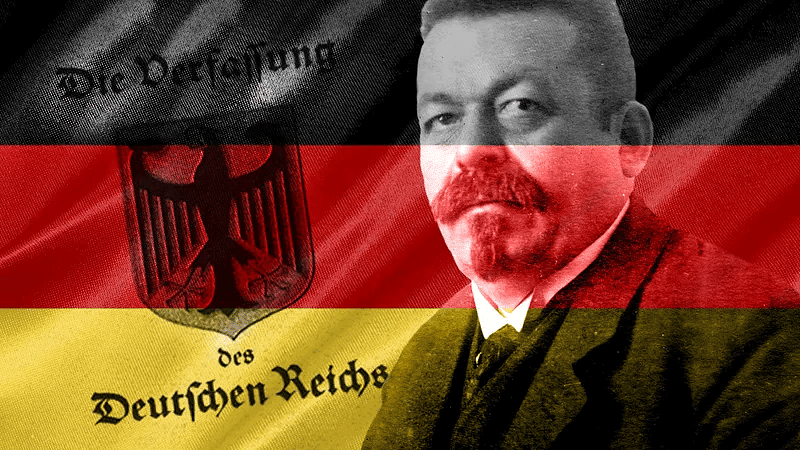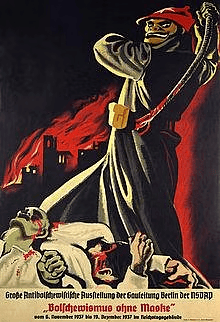NCERT Solutions for Class 9 History Chapter 3 - Nazism and the Rise of Hitler
Q1: Describe the problems faced by the Weimar Republic.
Ans: After Germany lost World War I, Emperor Wilhelm II abdicated, and the Weimar Republic was formed. The Republic faced the following problems:
- Versailles Treaty: The treaty that ended the war, took German territories, and resources, and required 6 billion pounds in reparations, making the Republic unpopular.
- Economic Crisis: War debts depleted gold reserves, causing the German mark to fall and prices to soar.
- Political Flaws: The Weimar Republic had a weak constitution with issues like proportional representation and Article 48, which allowed the President to rule by decree during emergencies. This made it hard for the Republic to handle economic crises effectively.

Q2: Discuss why Nazism became popular in Germany by 1930.
Ans: The end of World War I brought significant changes to Germany's political landscape, and the newly formed Weimar Republic faced many challenges right from the start.
- One of the biggest problems was the Great Depression. The Weimar Republic did little to address the economic crisis, and this created an opportunity for Hitler to present himself as a saviour to the German people, who were suffering from economic hardship and political instability.
- Hitler's powerful speeches promised to build a strong nation, reverse the injustices of the Versailles Treaty, restore the dignity of the German people, and create jobs for everyone. These promises gave people hope.
- Nazi propaganda was also very effective. The use of red banners with the Swastika, the Nazi salute, and enthusiastic applause during rallies made Nazism increasingly popular among the people.
Q3: What are the peculiar features of Nazi thinking?
Ans: The Nazi thinking was synonymous with Hitler’s worldview. The features of such thinking are as follows:
- Nazi ideology ranked races with Nordic Germans at the top and Jews at the bottom, while others were placed in between.
- They wanted more land (Lebensraum) for Germany, even if it meant taking it from others.
- Nazis twisted Darwin’s theory to justify that only the strongest races should survive.
- They valued 'racial purity,' deeming those with disabilities and certain ethnic groups as undesirable and subject to extermination.
- They saw war as a means to prove German superiority and rejected peace as weak.
Q4: Explain why Nazi propaganda was effective in creating a hatred for Jews.
Ans: The Nazi propaganda was highly effective in creating hatred for the Jews due to the following reasons:
- The Nazis used language and media very carefully to spread their ideas. They claimed Jews were inferior and undesirable.
- They took advantage of old Christian hatred of Jews, who were blamed for killing Christ, to increase German prejudice against them.
- Nazis taught children to hate Jews from a young age, firing Jewish teachers and expelling Jewish students.
- They made propaganda films, like "The Eternal Jew," to reinforce negative stereotypes and hatred of Jews.
Such kinds of propaganda made the Germans believe that the Jews were inferior to them.

Q5: Explain the role of women in Nazi society. Return to Chapter 1 on the French Revolution. Write a paragraph comparing and contrasting the role of women in the two periods.
Ans:
- In Nazi society, women were expected to be housewives, have many pure-blooded children, and avoid 'undesirables.'
- Those who complied received benefits like hospital perks and discounts. However, women who didn’t follow these rules faced severe punishment, including public shame, loss of family, jail, or death.
- This was very different from women’s roles during the French Revolution. French women fought for education, equal wages, and freedom from forced marriage. They could pursue careers, become artists, run businesses, and own property.
Q6: In what ways did the Nazi state seek to establish total control over its people?
Ans: The Nazis established control over its people by various means:
- The Nazis used posters and films to promote their ideas and gain support.
- They carefully controlled the media to shape public opinion and stir up hatred against those they labelled 'undesirable.'
- They created special security forces to enforce their rules and used police power to act without limits.
- Genocide and fear helped them maintain tight control over society.
|
56 videos|437 docs|80 tests
|
FAQs on NCERT Solutions for Class 9 History Chapter 3 - Nazism and the Rise of Hitler
| 1. What were the main causes of the rise of Nazism in Germany? |  |
| 2. Who was Adolf Hitler and what role did he play in the Nazi regime? |  |
| 3. What were the key features of Nazi ideology? |  |
| 4. How did the Nazis consolidate power after coming to power in 1933? |  |
| 5. What were the consequences of Nazi policies for Germany and Europe during World War II? |  |


















